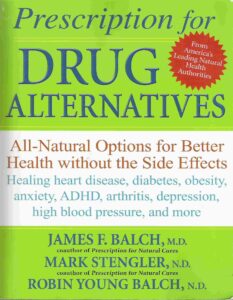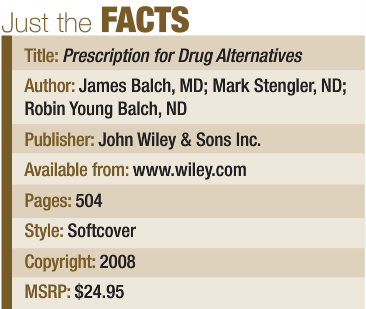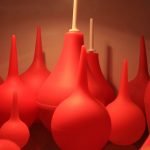Book Review: Prescription for Drug Alternatives
Stacie Deyglio, ND
From the authors of Prescription for Natural Cures, Drs. Balch and Stengler reunite to produce their new publication, Prescription for Drug Alternatives.

In their new book, the authors focus on comparing commonly used pharmaceutical drugs and effective natural alternatives for the treatment of chronic complaints. The heart of the material centers on distinguishing side effects to pharmaceutical drugs; exposing known interactions with other drugs, supplements or foods; describing safe alternatives; and illustrating nutrient depletions relative to pharmaceutical drug use.
The book is broken into three major parts. Part I consists of a brief introduction to “What you need to know about pharmaceutical drugs and alternative treatments.” This includes a review of the benefits and risks of pharmaceuticals, a summary of popular drugs and a steadfast confirmation of why natural medicine is a necessity for good health.
Part II possesses the core information: an inclusive description of treatments for chronic conditions, including most commonly prescribed drugs for respective conditions as well as alternative natural treatments to these complaints. For example: Chapter 21 focuses on obesity drugs and their natural alternatives. The chapter opens with a short description of obesity and then lists the pharmaceutical drugs most commonly prescribed for this complaint. This list includes drug names, how the drugs work, benefits, side effects, cautions, food/supplement interactions and nutrient depletions/imbalances. The chapter then describes natural alternatives to obesity drugs, including herbs, vitamins and supplements. It closes with a patient testimonial and complete reference listing.
 Part III of the book includes an A to Z list of nutritional supplements (where the substance is found, active constituents, use and common side effects/interactions) and a list of pharmaceuticals (names, common side effects, nutrient/drug interaction, use).
Part III of the book includes an A to Z list of nutritional supplements (where the substance is found, active constituents, use and common side effects/interactions) and a list of pharmaceuticals (names, common side effects, nutrient/drug interaction, use).
Prescription for Drug Alternatives is a great resource for patients and doctors alike. The authors provide a great service in connecting the disparity between demand for natural alternatives and conscious concern with side effects of pharmaceutical treatment. In this way the book best defines the naturopathic principle of Prevenire. Drs. Balch and Stengler provide information that intellectually supports the reader in making appropriate decisions to prevent illness as well as emphasizes building health, rather than treating disease.
 Stacie Deyglio, ND received her baccalaureate degree in biology, with a minor in chemistry from the College of Mt. St. Vincent in 1999. Resonating deeply with the philosophy and principles of naturopathic medicine, she graduated from the University of Bridgeport, College of Naturopathic Medicine in 2003. Dr. Deyglio’s interests focus on relating integrative therapeutics to the prevention of chronic disease in America. Currently residing in New York, Dr. Deyglio is an avid bookworm and writer. She is actively re-creating her practice.
Stacie Deyglio, ND received her baccalaureate degree in biology, with a minor in chemistry from the College of Mt. St. Vincent in 1999. Resonating deeply with the philosophy and principles of naturopathic medicine, she graduated from the University of Bridgeport, College of Naturopathic Medicine in 2003. Dr. Deyglio’s interests focus on relating integrative therapeutics to the prevention of chronic disease in America. Currently residing in New York, Dr. Deyglio is an avid bookworm and writer. She is actively re-creating her practice.










